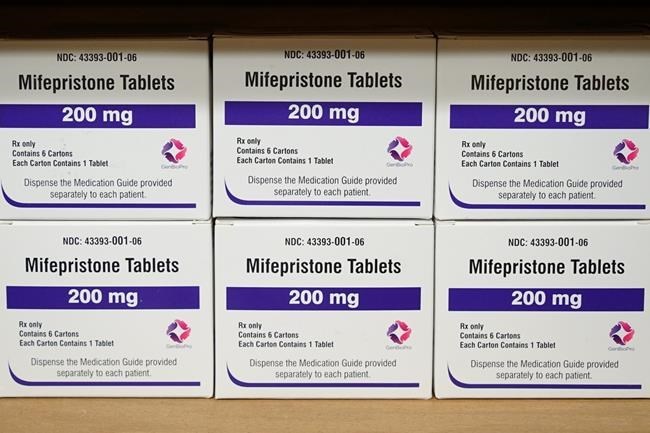WASHINGTON — The abortion debate is likely headed back to the U.S. Supreme Court, the scene of last summer's monumental decision to effectively end federal protections for the right of a woman to choose to end her pregnancy.
This time, the high court is expected to be tasked by week's end with resolving a federal stalemate over the abortion drug mifepristone — a dispute with the potential to imperil a core mission of the U.S. Food and Drug Administration.
Some in Canada are bracing for the potential fallout, but not everyone is holding their breath.
"Canadians love to talk about how this is going to have sort of a chilling effect," said Kelly Gordon, a politics professor and abortion rights expert at McGill University in Montreal.
"I have sort of a different take on that."
The decision last June to overturn Roe v. Wade, the landmark 1973 decision that effectively codified a woman's right to an abortion anywhere in the U.S., prompted predictions of a rush to the Canada-U.S. border.
But it never happened, Gordon said, in part because the Supreme Court ruling restored the ability of individual states to set their own rules, resulting in a patchwork of various restrictions and rights.
For many American women, getting an abortion in a state where it's still accessible, such as California, New York or Minnesota, is a far better option than travelling north of the border, she said.
And in Ottawa, the predictable reaction from the federal Liberal government was a vow to defend abortion rights in Canada and to allocate additional funding for groups that work to improve access to such services.
In Canada, Gordon said, "There's almost sort of a backlash against what's happening in the U.S., and not a following of it."
The controversy over mifepristone, which erupted on Friday after a pair of federal court decisions that came out within less than an hour of each other, neatly illustrates the political cleavages that abortion tends to expose in the U.S.
First, a judge in Texas issued an order invalidating the Food and Drug Administration's approval in 2000 of mifepristone, part of an ongoing lawsuit in that state challenging the drug's safety and the process used to approve it.
Almost simultaneously, in a separate case, a federal court judge in Washington state ordered that the government make the drug more readily accessible to those who need it.
The Texas decision is scheduled to take effect Friday, barring an appeal that was already underway.
An amicus brief filed Tuesday by pharmaceutical industry stakeholders as part of that appeals process framed the original ruling as nothing short of crippling the federal government's ability to protect and nurture its citizens.
"The district court's approach would have ripple effects across FDA's programs for drugs intended to treat serious and life threatening diseases and conditions," the brief reads.
"Patients would lose access to potentially lifesaving and life-improving treatments."
It's not at all clear how the controversy could shake out, and whether it would result in a sudden spike in demand for abortion drugs north of the border.
In most cases, while U.S. patients do have the ability to get their drugs from Canada, the drugs in question have to be FDA-approved, said Joyce Arthur, executive director of the Abortion Rights Council of Canada.
But at this stage, the Canadian Pharmacists Association is taking nothing for granted, said Joelle Walker, the association's vice-president of public and professional affairs.
The association is always on the watch for anything that could prompt a spike in foreign demand for certain drugs. Ozempic, a diabetes drug that's gained a following as a weight-loss treatment, is one recent example.
"If there is a restriction on (mifepristone) in the U.S., perhaps the natural tendency is to want to look to a Canadian supply," Walker said.
"If there is a constrained supply of a drug that's not available in the U.S., our concern or worry is that if (demand) spikes in Canada, we want to make sure that there's enough for Canadians."
Arthur said she's more concerned about whether the political forces in the U.S. that have been driving the recent legal challenges could eventually manifest themselves in Canada.
She described last year's Freedom Convoy protests in Ottawa as a "wake-up call" for anyone who believed that Canada would be immune from the sort of political and cultural divisions currently roiling the U.S.
"The fight is never over — they're always going to be trying to attack abortion rights in whatever way they possibly can and reduce access," Arthur said.
The U.S. experience, she added, "is a lesson for us to always be vigilant here in Canada, and make sure that nothing like that will ever happen up here."
More than half of all abortions that are performed in the U.S. are induced through medication, typically mifepristone paired with another medication, misoprostol. The two drugs are sold together in Canada as Mifegymiso.
Medical experts insist mifepristone, which was approved for use 23 years ago, is safe and less prone to complications than basic procedures such as wisdom teeth removal and colonoscopies.
This report by The Canadian Press was first published April 12, 2023.
— With files from The Associated Press
James McCarten, The Canadian Press



